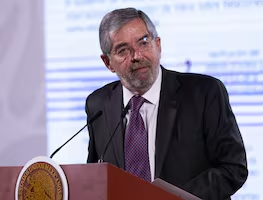Más Información

Posibles deportaciones masivas requieren acciones inmediatas: PRI; reducción de presupuesto del INM agrava situación

Diputada propone despenalizar sustancias psicoactivas; pide no criminalizar producción, tráfico, comercialización y consumo de drogas

Analizan reunión de cancilleres para enero; buscan coordinar estrategias antes posibles deportaciones masivas

Sheinbaum: se trabaja para que migrantes puedan acceder a programas del bienestar; colaboran Segob y consulados
In 1995 Joaquín “El Chapo” Guzmán, the leader of the Sinaloa cartel who has escaped twice from maximum security prisons in Mexico, planned the escape of Guillermo Saillez Cuevo, one of his collaborators, imprisoned in Tucson, Arizona, court documents obtained by EL UNIVERSAL show.
This is one of the 79 charges that “El Chapo” faces in California.
The escape was prevented thanks to the eavesdropping conducted by the Drug Enforcement Administration (DEA) of the phone calls made by Raúl Guzmán, an accomplice of the drug lord, who said that the cartel had contacts in the prison where Saillez was kept. Saillez was sentenced to 19 years in prison for drug trafficking and his escape was to be coordinated by Humberto Loya Castro, who allegedly helped Arturo Guzmán, brother of El Chapo, escape in 1991 after paying one million dollars to Mexican police.
Loya is also said to have bribed Mexican authorities so that the cartel could smuggle drugs freely in Colombia and the United States. Currently he is a protected witness of the U.S. government after agreeing to provide information about the cartel's operations.
The first accusation against El Chapo dates back to 1990, when he began smuggling drugs and money in airplanes through the company Aero Ejecutivos Poblanos.
Some of the drugs were kept in warehouses in Los Angeles and Texas. He is also accused of money laundering and smuggling drugs through tunnels, or importing cocaine hidden in cans of chili peppers and chicken wire rolls and with the help of fruit companies.
Extradition
Mexico's Federal Judiciary Council confirmed that a federal judge approved the extradition of Joaquín Guzmán to the United States. Now it is up to Mexico's Ministry of Foreign Affairs to approve his transfer within the next 30 days.
The defense of the leader of the Sinaloa Cartel can file an injunction to delay the process for up to one year if the case is taken to the Supreme Court of Justice of the Nation.
(With information from Juan Omar Fierro)






